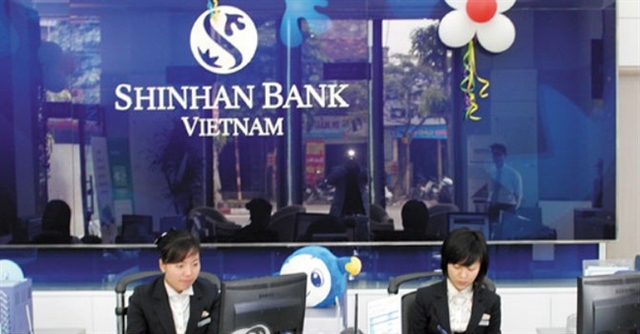The competition in the Vietnamese finance and banking market has become fiercer as existing foreign institutions are rushing to increase capital even as new entrants continually join the market.

The competition in the Vietnamese finance and banking market has become fiercer as existing foreign institutions are rushing to increase capital even as new entrants continually join the market.
This week alone, the State Bank of Viet Nam announced it had approved capital increases for Public Bank Vietnam Limited and Shinhan Bank Vietnam, a move that paves the way for the foreign banks to expand their operation in Viet Nam.
Malaysia’s Public Bank Vietnam Ltd on Tuesday received the SBV’s permission to increase its charter capital from VND3.65 trillion (US$156.65 million) to VND6 trillion ($257.85 million).
A day earlier, the SBV issued Document No 5096/NHNN-TTGSNH to allow South Korea’s Shinhan Bank Vietnam to increase its charter capital from VND4.55 trillion ($193.4 million) to VND5.71 trillion ($245.4 million).
Besides the capital hikes, some foreign banks have also asked the SBV to extend their operation licences in Viet Nam. On Monday, Japan’s Sumitomo Mitsui Banking Corporation in HCM City got the SBV’s permission to extend their tenure for an additional 99 years.
Foreign banks are also promoting their in-depth development in the Vietnamese market. Among them, Woori Bank Vietnam Limited late last month received approval from the SBV’s Governor to add stock depository services to its licence.
But the most notable moves by foreign investors have been in retail banking, especially consumer finance, which was previously considered a point of strength for domestic credit institutions.
On July 2, Shinhan Card, the leading credit card issuer in Korea, opened Shinhan Vietnam Finance Limited Company (Shinhan Finance) in HCM City. It is a 100 per cent foreign-owned consumer finance firm.
A few days earlier, on June 25, LOTTE Finance Company (LOTTE Finance) also officially launched in the Vietnamese market after six months of doing business.
Shinhan Finance has made no secret of its ambition to become one of the leading financial companies in Viet Nam. Lim Young Jin, President of Shinhan Card, said that with the strong combination of Shinhan Card’s technology platform, outstanding financial products and more than 10 years of experience developing the consumer lending market of Prudential Finance, Shinhan Vietnam Finance Company is committed to becoming the best customer support financial company in Viet Nam.
Rising inflow
The SBV’s statistics showed that the growth rate of equity capital and charter capital of foreign joint-venture banks was always two to three times higher than that of both State-owned and private Vietnamese commercial banks.
As of the end of April, the equity capital of foreign joint venture banks had increased by 8.7 per cent to more than VND177 trillion ($7.6 billion), while the growth rate of State-owned commercial banks was 5.06 per cent and of private Vietnamese commercial banks was 4.18 per cent.
Similarly, the charter capital of foreign joint-venture banks increased by 2.76 per cent to VND116.62 trillion ($5 billion), compared with the 0.75 per cent growth rate of State-owned commercial banks and 0.61 per cent of Vietnamese commercial banks.
Banking expert Nguyen Tri Hieu forecast a continually rising foreign capital inflow to the country’s finance and banking market as many foreign investors show their interest in Vietnamese banks and financial companies.
“The Vietnamese market, especially consumer finance, has high growth potential, given the country’s population of nearly 100 million with only 30 per cent of them having access to banking services, Hieu told Viet Nam News.
Hieu said foreign investors also expected to seize opportunities presented by new-generation free trade agreements such as the Comprehensive and Progressive Agreement for Trans Pacific Partnership (CPTPP) and the EU-Viet Nam Free Trade Agreement (EVFTA), which Viet Nam has just signed.
The increase in the activity of foreign banks will make competition pressure on the monetary market more and more fierce, Hieu said, adding Vietnamese banks need to operate on a larger scale with huge investments in technology and products through consolidations and mergers to create stronger institutions that are able to compete with foreign banks.
However, the presence of foreign investors will also bring many opportunities for the domestic monetary market and consumers will be the beneficiaries, he said.
The Vietnamese currency market has nine foreign-owned banks including ANZ, HSBC, Standard Chartered, Shinhan Bank, Hong Leong Bank, CIMB Bank, Public Bank Berhad, Wooribank and United Overseas Bank Limited. There are also about 50 foreign bank branches, more than 50 representative offices of foreign credit institutions and many foreign-owned finance companies. — VNS





